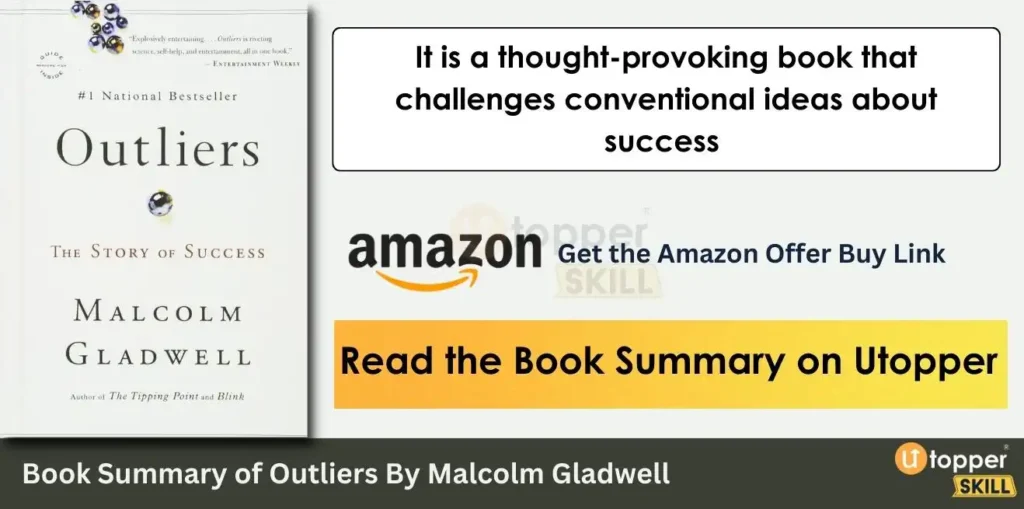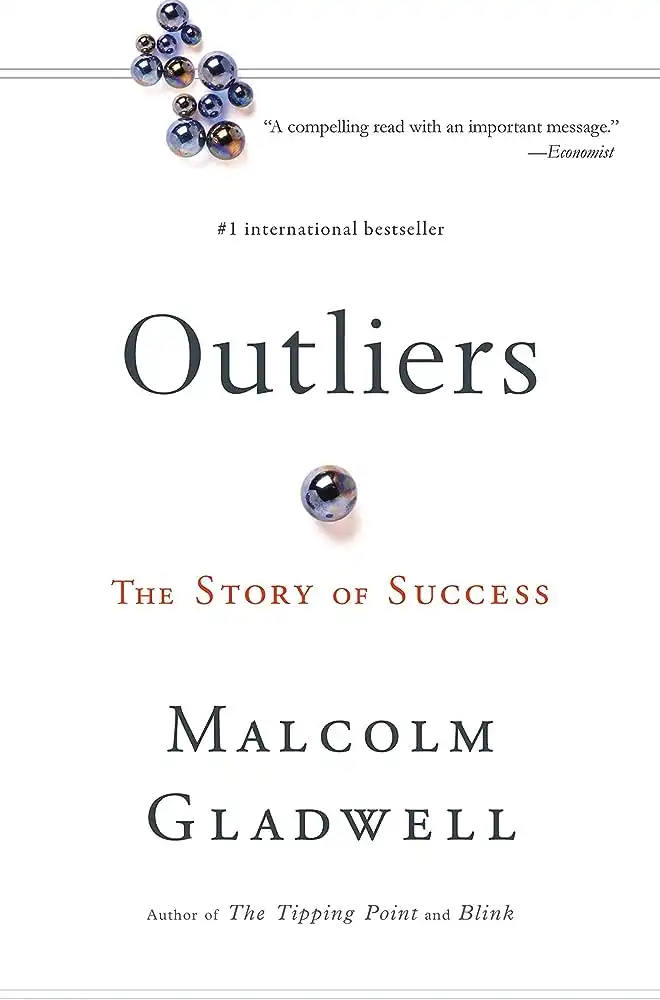Book Summary of Outliers

“Outliers: The Story of Success” by Malcolm Gladwell is a thought-provoking exploration of what truly lies behind extraordinary success. Gladwell challenges the conventional notion that individual talent and hard work are the sole factors responsible for success, arguing that the circumstances and opportunities individuals are born into play a pivotal role.
In this article, we are Writing a Book Summary of Outliers, 1 Line summary of Outliers, the Best quotes of Outliers and the Best Lines of Outliers.
Drawing on a wide range of examples from the lives of successful people, Gladwell delves into the concept of the “10,000-hour rule” and examines how cultural backgrounds, family support, and even birth dates can significantly influence one’s path to achievement. Through engaging storytelling and compelling research, “Outliers” offers readers a fresh perspective on the complex interplay between talent, effort, and the external factors that shape our lives.
1 Line Summary of the Book
It is a thought-provoking book that challenges conventional ideas about success by examining external factors that contribute to it.
Book Summary of “Outliers”
Introduction
Outliers By Malcolm Gladwell is a fascinating book that examines the factors that lead to high levels of success.
In the book Outliers, Gladwell challenges the popular idea that success is the result of individual talent and hard work. Also, he argues that success is also influenced by external factors such as culture, family background, and even luck.
The 10,000 Hour Rule
One of the most well-known concepts in Outliers is the 10,000-hour rule. Gladwell argues that it takes approximately 10,000 hours of deliberate practice to achieve mastery in a given field. This idea is based on the work of psychologist Anders Ericsson, who found that elite performers in various fields had put in an enormous amount of practice before achieving success. Gladwell illustrates this idea by examining the stories of successful people such as Bill Gates and The Beatles, who all put in countless hours of practice before achieving success.
Cultural Legacy
Gladwell argues that culture plays a significant role in determining success. He examines the story of the town of Roseto, Pennsylvania, which had a remarkably low rate of heart disease despite having a population with a high-risk profile. Gladwell attributes this to the strong sense of community and social support in Roseto. Similarly, he discusses the cultural legacy of rice farming in Asia and how it contributes to the success of Asian students in mathematics.
The Importance of Timing
Timing is another crucial factor in success, according to Gladwell. He uses the example of the birthdates of professional hockey players, showing that a disproportionate number of players were born in the first few months of the year. Gladwell argues that this is because youth hockey leagues have age cutoffs based on the calendar year, so the players born in January and February have an advantage because they are older and more physically mature than their peers. This gives them a head start in their development, leading to greater success later on.
The Power of Connections
Gladwell also discusses the importance of connections and opportunities. He uses the example of the “Matthew Effect,” which refers to the idea that the rich get richer and the poor get poorer. Gladwell argues that people who have already achieved success are more likely to be given additional opportunities and resources, leading to even greater success. He also discusses the idea of “cultural capital,” which refers to the non-financial resources that people have access to, such as education and social connections.
Chapter Summary of “Outliers”
Chapter 1: The Matthew Effect
Gladwell introduces the concept of the Matthew Effect, which states that those who have more will be given more, while those who have less will have even less. He examines how advantages in childhood, such as access to education and support, can lead to success later in life.
Chapter 2: The 10,000 Hour Rule
Gladwell discusses the idea that it takes approximately 10,000 hours of deliberate practice to achieve mastery in a given field. He uses examples such as The Beatles and Bill Gates to illustrate how putting in countless hours of practice can lead to success.
Chapter 3: The Trouble with Geniuses, Part 1
Gladwell examines the story of Christopher Langan, a genius with an exceptionally high IQ who struggled to achieve success due to external factors such as his difficult upbringing and lack of resources.
Chapter 4: The Trouble with Geniuses, Part 2
Continuing from the previous chapter, Gladwell examines how high IQ alone is not enough for success. He uses the example of a study of children with high IQs and how many of them did not achieve significant success later in life.
Chapter 5: The Three Lessons of Joe Flom
Gladwell examines the story of Joe Flom, a successful lawyer, and uses his story to illustrate how cultural and historical factors can play a significant role in success.
Chapter 6: Harlan, Kentucky
Gladwell examines the story of a small town in Kentucky and how cultural legacies, such as the “culture of honor,” contribute to violence and poor outcomes.
Chapter 7: The Ethnic Theory of Plane Crashes
Gladwell discusses the importance of communication and cultural factors in aviation accidents. He uses the example of Korean Air and how their hierarchical culture contributed to a high number of accidents.
Chapter 8: Rice Paddies and Math Tests
Gladwell examines the cultural legacy of rice farming in Asia and how it contributes to the success of Asian students in mathematics.
Chapter 9: Marita’s Bargain
Gladwell discusses the importance of educational opportunities and support for success. He uses the example of a successful educational program in New York City and how it provides disadvantaged students with the support they need to succeed.
BUY “Outliers”
Outliers by Malcolm Gladwell is a thought-provoking book that challenges conventional ideas about success by examining external factors that contribute to it.
Conclusion
Outliers is a thought-provoking book that challenges conventional ideas about success. By examining the stories of successful people and analyzing external factors that contribute to success, Gladwell shows that individual talent and hard work are not the only factors that determine success. The 10,000-hour rule, cultural legacy, timing, and connections all play crucial roles. This book is a must-read for anyone interested in understanding what makes some people successful while others struggle.
Best Quotes of “Outliers”
- “Achievement is talent plus preparation.” – This quote emphasizes the idea that success is not just about natural talent, but also about putting in deliberate practice and preparation.
- “The values of the world we inhabit and the people we surround ourselves with have a profound effect on who we are.” – This quote highlights the idea that culture and environment play a significant role in shaping who we are and our chances of success.
- “We are so caught in the myths of the best and the brightest and the self-made that we think outliers spring naturally from the earth.” – This quote challenges the notion that successful people achieve success solely through their own efforts and talents, and emphasizes the importance of external factors.
- “It’s not how much money we make that ultimately makes us happy between nine and five. It’s whether or not our work fulfills us.” – This quote highlights the idea that true happiness and fulfillment come from finding meaning and purpose in our work, not just from financial success.
- “Success is not a random act. It arises out of a predictable and powerful set of circumstances and opportunities.” – This quote reinforces the central theme of the book, that success is not just about individual talent and hard work, but also about external factors such as timing, culture, and connections.
Best Lines of “Outliers”
- “The sense of possibility so necessary for success comes not just from inside us or from our parents. It comes from our time: from the particular opportunities that our place in history presents us with.”
- “Success is not a lone effort, it is a collaborative effort.”
- “To build a better world we need to replace the patchwork of lucky breaks and arbitrary advantages that today determine success – the fortunate birth dates and the happy accidents of history – with a society that provides opportunities for all.”
- “It’s not how much money we make that ultimately makes us happy between nine and five. It’s whether or not our work fulfills us.”
- “Outliers are those who have been given opportunities – and who have had the strength and presence of mind to seize them.”
“Outliers” Book By Malcolm Gladwell

Must Read Book About conventional ideas about success
- “Outliers are those who have been given opportunities – and who have had the strength and presence of mind to seize them.””Success is not a lone effort, it is a collaborative effort.”
- “Success is not a random act. It arises out of a predictable and powerful set of circumstances and opportunities.”
- Timing is important in achieving success. Opportunities and advantages can arise from being in the right place at the right time.
Lesson to Learn from “Outliers”
- Success is not just about individual talent and hard work. External factors such as culture, timing, and connections also play a significant role.
- Deliberate practice is necessary for achieving mastery in a given field. It takes approximately 10,000 hours of practice to achieve mastery.
- Cultural legacy can have a significant impact on success. For example, the rice farming culture in Asia contributes to the success of Asian students in mathematics.
- Timing is important in achieving success. Opportunities and advantages can arise from being in the right place at the right time.
- Connections and access to resources can greatly contribute to success. The “Matthew Effect” states that those who have more will be given more, while those who have less will have even less.
- Educational opportunities and support are essential for success. Disadvantaged students need access to support and resources to achieve their potential.
- Success is not just about achieving financial wealth or status. True happiness and fulfillment come from finding meaning and purpose in our work and making a positive impact in the world.
Frequently Asked Questions on “Outliers”
Q.1 What is the 10,000 hour rule?
The 10,000 hour rule is the idea that it takes approximately 10,000 hours of deliberate practice to achieve mastery in a given field. This idea was based on the work of psychologist Anders Ericsson and was popularized by Malcolm Gladwell in Outliers.
Q.2 What is the Matthew Effect?
The Matthew Effect refers to the idea that those who have more will be given more, while those who have less will have even less. This concept is discussed in Outliers and applies to advantages in childhood, access to education and support, and additional opportunities and resources for those who have already achieved success.
Q.3 How does cultural legacy contribute to success?
Cultural legacy can contribute to success by shaping the values, beliefs, and behaviors of a group of people. For example, the rice farming culture in Asia contributes to the success of Asian students in mathematics, as they have a strong work ethic and value persistence in the face of difficulty.
Q.4 How important are connections and opportunities in achieving success?
Connections and opportunities can play a significant role in achieving success. The “Matthew Effect” states that those who have already achieved success are more likely to be given additional opportunities and resources, leading to even greater success. Additionally, cultural capital, or non-financial resources such as education and social connections, can be a key factor in achieving success.
Q.5 Is success purely the result of individual talent and hard work?
No, success is not purely the result of individual talent and hard work. External factors such as culture, timing, and connections can also play a significant role in determining success.
Q.6 How important are educational opportunities and support for success?
Educational opportunities and support are essential for success, particularly for disadvantaged students. Without access to support and resources, students may not be able to achieve their potential
Q.7 Can success lead to happiness and fulfillment?
Success does not necessarily lead to happiness and fulfillment. True happiness and fulfillment come from finding meaning and purpose in our work and making a positive impact in the world.
